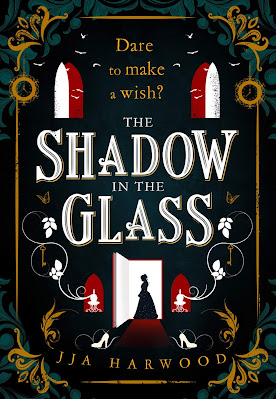Book #11
Once upon a time Ella had wished for more than her life as a lowly maid.Now forced to work hard under the unforgiving, lecherous gaze of the man she once called stepfather, Ella’s only refuge is in the books she reads by candlelight, secreted away in the library she isn’t permitted to enter.One night, among her beloved books of far-off lands, Ella’s wishes are answered. At the stroke of midnight, a fairy godmother makes her an offer that will change her life: seven wishes, hers to make as she pleases. But each wish comes at a price and Ella must to decide whether it’s one she’s willing to pay it.
With The Shadow in the Glass, Harwood gives us a gritty tale of riches to rags, and back again, with the use of an eerie Victorian setting, a helpless protagonist, and demoniac interventions.
After the death of her mother, Eleanor is taken in by the wealthy Mrs Pembroke and adopted as a lady in training. She is used to fine things, and is confident she’ll go on to live a luxurious life. When Mrs Pembroke dies, Eleanor is relegated to the position of housemaid, with all dreams of finery eradicated. Her only consolation is sneaking into the library of the large house when everyone else is in bed. Here, one night, a black-eyed woman appears to her, and offers to grant her seven wishes in exchange for her soul.
We are soon catapulted into a supernatural tempest as Eleanor begins to make wishes and discover the price she pays for these won’t just be her soul. There are twists and turns, ‘will she, won’t she’ implications, and a whole host of obstacles for Eleanor to navigate - most of which aren’t in any way paranormal.
Many questions are posed here. Although said to be a dark retelling of Cinderella, we have never thought of Cinderella to be dark herself. Eleanor is a complicated and desperate protagonist, willing to commit the most terrible of acts. Sometimes she is looking out for others, sometimes she is only looking out for herself. It’s a very human and realistic characterisation of desire and ambition, yet Harwood forces us to wonder who the real villain is here - demon or human?
I did find the pacing to be a bit frustrating; the novel seems to take an age to kick into action, and although engagement does improve the further in you venture, I felt there were a lot of filler passages containing Eleanor’s ponderings, woe is me floundering, and self-chastisements.
Despite this, Harwood has painted an excellent, if grim, picture of Victorian London and the hardships faced by women in this prejudiced environment. Her setting is consistently bleak - fogs, clouds, grime, rain - which helps to cast a forbidding tone throughout the entire plot.
A forbidding and bleak look at the power of longing, the desperation of intent, and the stark necessities required of a lower class woman in the 1800s. And not forgetting demons.

